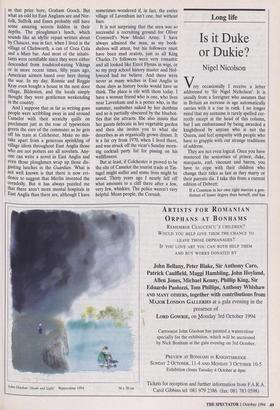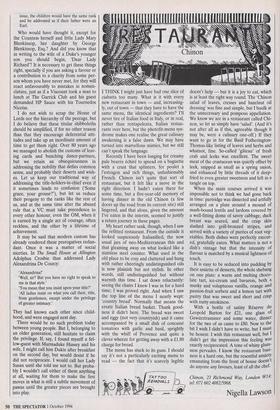Long life
Is it Duke or Dukie?
Nigel Nicolson
Very occasionally I receive a letter addressed to 'Sir Nigel Nicholson'. It is usually from a foreigner who assumes that in Britain an increase in age automatically carries with it a rise in rank. I no longer mind that my surname is rarely spelled cor- rectly except at the head of this column, but I am embarrassed by being awarded a knighthood by anyone who is not the Queen, and feel sympathy with people who have to grapple with our strange traditions of address.
They are not even logical. Once you have mastered the seniorities of prince, duke, marquess, earl, viscount and baron, you have to cope with their children who change their titles as fast as they marry or their parents die. I take this from a current edition of Debrett: If a Countess in her own right marries a gen- tleman of lesser degree than herself, and has
issue, the children would have the same rank and be addressed as if their father were an Earl.
Who would have thought it, except for the Countess herself and little Lady Mary Blenkinsop, her daughter by George Blenkinsop, Esq.? And did you know that in writing to the wife of a Duke's younger son you should begin, `Dear Lady Richard'? It is necessary to get these things right, specially if you are asking a favour or a contribution to a charity from some per- son whom you have never met, for they will react unfavourably to mistakes in nomen- clature, just as if a Viscount took a man to lunch at The Garrick Club and his guest demanded HP Sauce with his Tournedos Nicoise.
I do not wish to scrap the House of Lords nor the hierarchy of the peerage, but I do believe that these titular shibboleths should be simplified, if for no other reason than that they encourage deferential atti- tudes and take up an inordinate amount of time to get them right. Over 80 years ago we managed to abolish the customs of leav- ing cards and bunching dance-partners, but we retain an obsequiousness in addressing the nobility that defies common sense, and probably their deserts and wish- es. Let us keep our traditional way of addressing the title-holders-in-chief even if it sometimes leads to confusion (`Some grace, your grouse?'), but let us reduce their progeny to the ranks like the rest of us, and at the same time alter the absurd rule that a VC must take precedence to every other honour, even the OM, when it is earned by a single act of courage, often reckless, and the other by a lifetime of achievement.
It may be said that modern custom has already rendered these prerogatives redun- dant. Once it was a matter of social niceties. In The Small House at Allington Adolphus Crosbie thus addressed Lady Alexandrina De Courcy:
`Alexandrine 'Well, sir? But you have no right to speak to me in that style.'
`You mean that you insist upon your title?' 'All ladies insist on what you call their, title, from gentlemen, except under the privilege of greater intimacy.'
They had known each other since child- hood, and were engaged next day.
There would be no such problem today between young people. But I, belonging to an older generation, still hesitate to claim the privilege. If, say, I found myself a fel- low-guest with Marmaduke Hussey and his wife, I might call him Dukie after breakfast on the second day, but would desist if he did not reciprocate. I would call her Lady Susan until she told me not to. But proba- bly I wouldn't call either of them anything at all, waiting for them to make the first moves in what is still a subtle movement of pawns until the greater pieces are brought into play.



























































 Previous page
Previous page